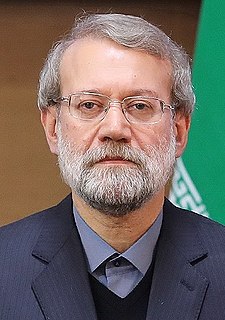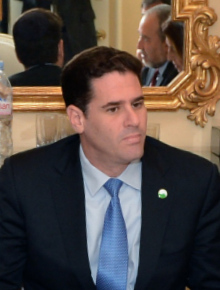A Quote by Peter MacKay
You can't have a discussion about Israel and the region without including Iran and their nuclear ambitions.
Related Quotes
I think it is less the limited amount of information than the filters that information about the Middle East must pass through before being fairly addressed in the mainstream media. In more intellectual and geopolitical terms, the perceptions of the region are distorted by a combination of Orientalism and the priorities of the state of Israel, including the refusal to discuss the relevance of Israel's nuclear weapons arsenal in the context of addressing Iran on its nuclear program.
My reading of the threat from Iran is that if Iran acquires nuclear weapons, it is an existential threat to the State of Israel and to other countries in the region because the other countries in the region will feel compelling requirement to acquire nuclear weapons as well. Now we cannot a second Holocaust.
That Iran is willing to threaten Israel is wrong[. . . .] We pose no threat and if we are conducting nuclear research and development we are no threat to Israel. We have no intention of aggression against any country. [. . .] Today we announce to you that the political will of Iran is aimed at the negotiated settlement of the case and we dont want to aggravate the situation in our region[. . . .] We know that this issue can be settled in a constructive dialogue and we welcome that.
Iran has been calling for it for years, and the Arab countries support it. Everyone except the United States and Israel support it. The U.S. won't allow it because it means inspecting Israel's nuclear weapons. The U.S. has continued to block it, and in fact blocked it again just a couple of days ago; it just wasn't widely reported. Iran's nuclear program, as U.S. intelligence points out, is deterrent, and the bottom line is that the U.S. and Israel don't want Iran to have a deterrent.
Many countries that formerly saw Israel as an enemy now see Israel as a potential partner in addressing their primary security challenges. And so first and foremost, Iran. The rise of Iran, the empowerment of Iran has created a big change in the dynamics in the region. The second was the rise of ISIS.
We support any deal that denies Iran nuclear weapons, that has a continuous and robust inspection mechanism and that has snap-back provisions in case Iran violates the agreement. Our concern is that Iran will use the income it receives as a result of the lifting of the nuclear sanctions in order to fund its nefarious activities in the region.
Without a deal [with Iran], the international sanctions regime will unravel with little ability to reimpose them. With this deal, we have the possibility of peacefully resolving a major threat to regional and international security. Without a deal, we risk even more war in the Middle East and other countries in the region would feel compelled to pursue their own nuclear programs, threatening a nuclear arms race in the most volatile region in the world.
Even as we implement the nuclear deal and welcome our Americans home, we recognize that there remain about differences between the United States and Iran. We remain steadfast in opposing Iran's destabilizing behavior elsewhere, including its against Israel and our Gulf partners and its support for violent proxies in places like Syria and Yemen.
The Iranian regime supports violent extremists and challenges us across the region. It pursues a nuclear capability that could spark a dangerous arms race and raise the prospect of a transfer of nuclear know-how to terrorists. Its president denies the Holocaust and threatens to wipe Israel off the map. The danger from Iran is grave, it is real.






























